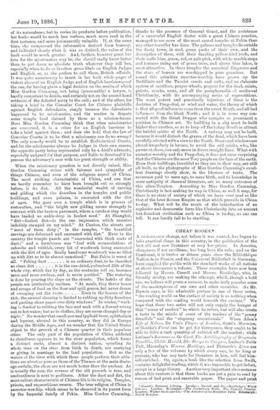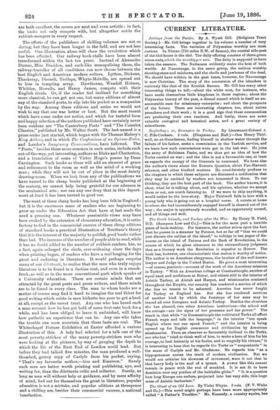CHEAP BOOKS.*
A n}13iARK.IBLE change, not before it was wanted, has begun to take practical shape in this country, in the publication of the best old and new literature at very low prices. In America, cheapness, if not excellence, has long been the rule ; and on the Continent, it is twelve or fifteen years since the BibliotlAque Nationale in France, and the Universal Bibliothek in Germany, have supplied the public with the standard works of all nations at about threepence a volume. These examples have now been followed by Messrs. Cassell and Messrs. Routledge, who, in friendly rivalry, are making the attempt, which, though a bold one, we believe will prove a success, to make truly popular some of the masterpieces of our own and other countries. As Mr. Rowels says, in his admirable preface to one of these series, " the reading world on the surface of society is as nothing when compared with the reading world beneath the surface." We hope that these two series will not only supply the hunger of that " ocean of readers " to which he refers, but will also create a taste in the minds of some of the readers of the "penny dreadfuls " and the "sixpenny sensationals." When Allen's Life of 11Telson, De Foe's Plague of London, Scott's 3farmion, or Goethe's Faust can be got for threepence, they ought to be able to drive a vast quantity of rubbish off the market ; while Latimer's Sermons on. the Card, The Autobiography of Benjamin Franklin, Chit& Harold, She Stops to Conquer, Luther's Table Talk, Macaulay's Warren. Hastings, and Plutarch's Lives are only a few of the volumes by which every one, be he king or peasant, who has any taste for literature in him, will feel him- self enriched. Or, again, a book like the selection from Swift, contains delightful reading, which it was impossble to get before, except in a large library. Another very important circumstance about this venture is that these books are not a pain to read by reason of bad print and execrable paper. The paper and print • Cassell's National Library. London : Ca'sell and Co.—Boutledye's World Library. London : Etantledge.—The Canterbury Poets. The Canttlot Classics. London : Walter Scott and Co.—The Autocrat of the Breakfast Table. Edinburgh; David DonaLsa.
are both excellent, the covers are neat and even artistic ; in fact, the books not only compete with, but altogether outdo the rubbish-mongers in every respect.
The efforts of the publishers of shilling volumes are not so daring, but they have been longer in the field, and are not less useful. One illustration alone will show the revolution which has been effected. Our railway book-stalls have been almost transformed within the last ten years. Instead of Alexandre
Dumas, Miss Braddon, and such-like monopolising them, the railway-traveller of all conditions can now choose between the best English and American modern writers. Lytton, Dickens, Thackeray, Disraeli, Trollope, Whyte-Melville, are spread out to him in tempting array. Hawthorne, Wendell Holmes, Whittier, Howells, and Henry James, compete with their English rivals. Or, if the reader feel inclined for something more classical, he can get not one, but many editions of almost any of the standard poets, to slip into his pocket as a companion by the way. Among these editions and series we would not wish to say that one was better or best. But the most recent which have come under our notice, and which for tasteful form and happy selection of the authors published have certainly never been outdone are "The Canterbury Poets" and "The Camelot Classics," published by Mr. Walter Scott. The last-named is a prose series just started, which began with Sir Thomas Malory's King Arthur, and in which The Confessions of an Opium-Eater, and Landor's Imaginary Conversations, have followed. The "Poets," besides those more common in such series, include such out-of-the-way, yet interesting, authors as Blake and Chatterton, and a translation of some of Victor Hugo's poems by Dean Carrington. Such books as these will add an element of grace and refinement to the room as well as the mind of a working man ; while they will not be out of place in the most dainty drawing-room. When we look from any of the publications we have named to the cheap books published at the beginning of the century, we cannot help being grateful for our advance in the mechanical arts ; nor can any one deny that in this depart- ment at least it has been turned to good use.
The want of these cheap books has long been felt in England ; but it is the enormous mass of readers who are beginning to grow up under the Education Act that have at last made the need a pressing one. Whatever pessimistic views may have been evoked by the extension of elementary education, it is satis- factory to find in the commercial success of these cheap editions of standard books a practical illustration of Bentham's theory that it is the interest of the majority to publish good books rather than bad. The increase of the number of people able to read, while it has no doubt added to the number of rubbish-readers, has, as a fact, again enlarged the circle, ever-widening since the days when printing began, of readers who have a real longing for the great and enduring in literature. It would perhaps surprise many of our dilettanti, to realise that the man who truly enjoys literature is to be found in a fustian coat, and even in a smock- frock, as well as in the more conventional garb which speaks of a University education. There are certain minds that are attracted by the great poets and prose writers, and these minds are to be found in every class. The man to whom books are a matter of course may find it bard to imagine the real thirst for good writing which exists in men hitherto too poor to get a book at all, except as the rarest treat. Any one who has heard such a man recount how he has got hold of some first-rate book for a while, and has been obliged to leave it unfinished, will know how pathetic an experience that can be. Any one who takes the trouble can soon ascertain that these facts are real. The Whitechapel Picture Exhibition at Easter afforded a curious illustration of this. A lady had selected for a talk one of the most poverty-stricken of the many poverty-stricken men who were looking at the pictures, by way of ganging the depth to which the life of the East End of London could lead. But before they had talked five minutes, the man produced a well- thumbed, greasy copy of Carlyle from his pocket, saying, "That's my favourite author,—him and Emerson." Surely such men are better worth printing and publishing, aye, and writing for, than the dilettante critic and collector. Surely, as long as men will without help or guidance, and by mere affinity of mind, find out for themselves the great in literature, popular education is not a mistake, and popular editions at threepence and a shilling are, besides their commercial success, a national benefaction.





































 Previous page
Previous page